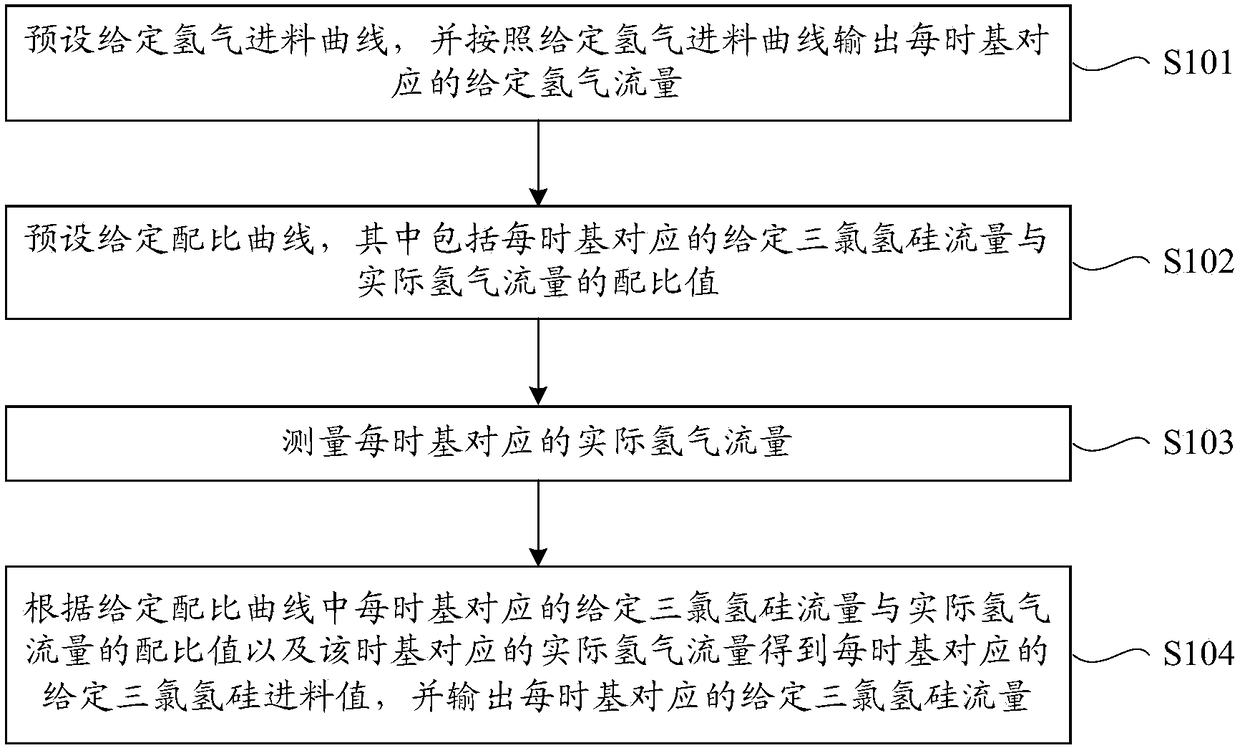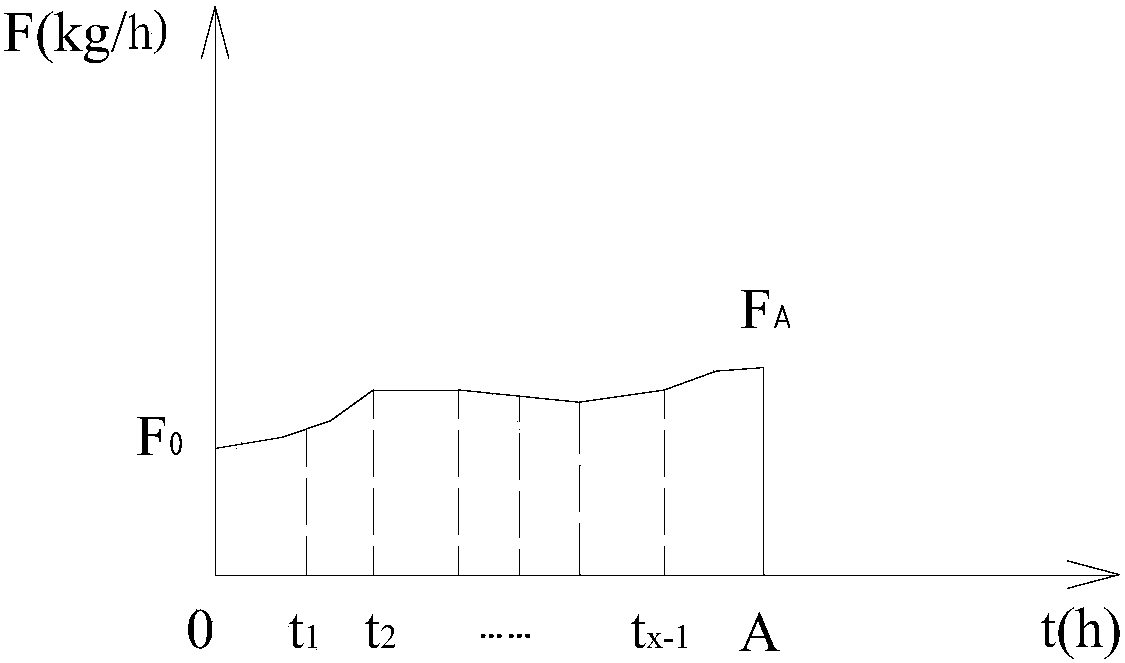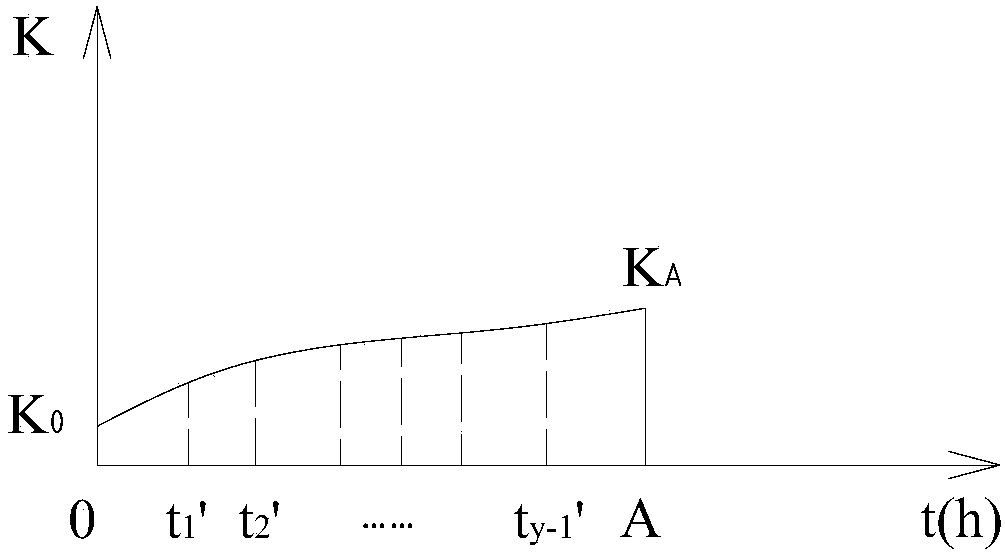Automatic feeding method of polycrystalline silicon reduction furnace and device
An automatic feeding and reducing furnace technology, applied in chemical instruments and methods, silicon compounds, inorganic chemistry, etc., can solve the problems of complicated operation, poor repeatability, unfavorable for regular summary and adjustment, etc., to avoid manual operation and repeatability. High, the effect of preventing contamination incidents of polysilicon products
- Summary
- Abstract
- Description
- Claims
- Application Information
AI Technical Summary
Problems solved by technology
Method used
Image
Examples
Embodiment 1
[0030] Such as figure 1 As shown, this embodiment provides an automatic feeding method for a polysilicon reduction furnace, including the following steps S101 to S104.
[0031] S101. Preset a given hydrogen feed curve, and output a given hydrogen flow corresponding to each time base according to the given hydrogen feed curve.
[0032] In this step, if figure 2 As shown, the given hydrogen feed curve can be represented by line segments connected end-to-end in sequence by x segments, that is, the given hydrogen feed curve can be approximately expressed as a polyline, where the time points are t 0 ,t 1 ,t 2 ,·····,t x-1 ,t x , and the corresponding given hydrogen flow values in turn are F 0 ,F 1 ,F 2 ,·····,F x-1 ,F x , in the time interval formed by adjacent time points (that is, each time base), the given hydrogen flow rate changes in a straight line (increasing or decreasing), then the expression of the given hydrogen flow rate corresponding to each time base is a...
Embodiment 2
[0053] Such as Figure 4 As shown, this embodiment provides an automatic feeding device for a polysilicon reduction furnace, including a hydrogen control unit 100 , a ratio setting unit 500 , a hydrogen flow measurement unit 200 , and a trichlorosilane control unit 300 .
[0054] The hydrogen control unit 100 is used to preset a given hydrogen feed curve, and output a given hydrogen flow corresponding to each time base according to the given hydrogen feed curve.
[0055] The given hydrogen feed curve preset in the hydrogen control unit 100 can be represented by line segments connected end-to-end in turn by x segments, that is, the given hydrogen feed curve is approximately expressed as a polyline, and the time points are respectively t 0 ,t 1 ,t 2 ,·····,t x-1 ,t x , and the corresponding given hydrogen flow values in turn are F 0 ,F 1 ,F 2 ,·····,F x-1 ,F x , in the time interval formed by adjacent time points (that is, each time base), the given hydrogen flow rate...
PUM
 Login to View More
Login to View More Abstract
Description
Claims
Application Information
 Login to View More
Login to View More - Generate Ideas
- Intellectual Property
- Life Sciences
- Materials
- Tech Scout
- Unparalleled Data Quality
- Higher Quality Content
- 60% Fewer Hallucinations
Browse by: Latest US Patents, China's latest patents, Technical Efficacy Thesaurus, Application Domain, Technology Topic, Popular Technical Reports.
© 2025 PatSnap. All rights reserved.Legal|Privacy policy|Modern Slavery Act Transparency Statement|Sitemap|About US| Contact US: help@patsnap.com



